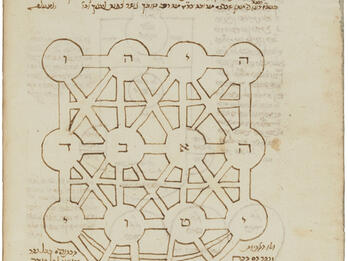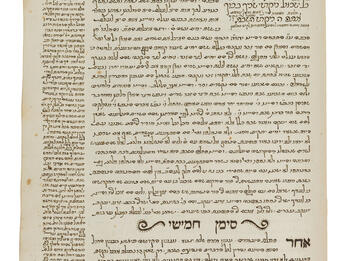Sulam ha-‘aliyah (The Ladder of Ascension)
Chapter Ten
Concerning the explanation of the paths of hitbodedut [contemplation] and conjunction and the preparations that are proper for one who practices hitbodedut in order to arrive at his intended goal, so that his soul conjoins with the Active Intellect and the holy spirit comes upon him.
Know that the proper preparations necessary for one who practices hitbodedut in order to find the desired objects in the abstraction of his intellect from matter include many components. The first concerns the body: one needs to minimize material desires, i.e., those concerning consumption. He should accustom himself to eating very small quantities of high-quality foods and limit himself concerning various kinds of cooked foods and consuming quantities of wine, as is said by our rabbis of blessed memory [m. Avot 4:4]: “Such is the way of the Torah, etc.” The intention is not that one should live like a frustrated mourner, for this would keep him from attaining perfection. Rather, the intention is that even if one has great wealth and much satisfaction, it is proper not to benefit from it unless merely for the purpose of maintaining the soul in the body. And he should subdue his bestial faculties and not give them anything to desire, for by weakening their power, the soul will be strengthened and the intellect will be released from the constraint of its bestial faculties into actuality and will conjoin with its Creator.
In regard to sexual intercourse as well, it is proper to expand on that which our rabbis of blessed memory have said [m. Berakhot 22:1]: “that one should not be like a rooster with his wife,” but should fulfill the commandment of having sexual relations [with one’s wife] every Sabbath eve. And this should be in great cleanliness and purity, and all his thoughts about this should be of serving his Creator and conjoining with the upper realm, as the kabbalists have explained concerning the secret of the conjoining and the unity of male and female in this matter. For then, when his thought conjoins with the Upper Place, and he is as scripture says: you have walked in His ways (Deuteronomy 28:9), then that conjoining and the fulfillment of this commandment in this way will bring him to a higher degree and much [divine] emanation. He still needs to purify his body by dipping in the waters of the mikveh, even if he carried out the commandment of conjoining correctly, for it is not suitable for him to approach the holy work unless he does so in ritual purity and cleanliness.
And when he accustoms his body and material faculties in this manner, and does so consistently for a long period of time—not for one or two days and not only for a month, but for a long period of time, until he gets to the point where the material faculties are no longer troubling him by asking from him that which was previously in their power to ask—when he does this, then he will move to repairing some of the things that are in need of repair for his soul, both to repair his moral qualities and also the degrees of the qualities, and in particular in order to remove the quality of anger and worry and superfluous craving, for these qualities make it harder for him to attain a high level.
And in this way, he will rise to the level of equanimity, as the same wise man used to say to his student who asked that he teach him the Account of the Chariot.1 And he answered his student, “Have you achieved equanimity?” And the student did not know what was said to him until he [his teacher] explained the matter to him, and it is that one achieves equanimity concerning his attributes. That is, he said to him, “If some man were to curse you and to take that which is yours, would you get angry and be impatient concerning this matter within your soul? And if he were to do the opposite to you, for example, were he to pay you honor and give you many gifts, would you be happy and would you feel happiness in your soul and an arousal of pleasure in this matter?” The student said to him that he would certainly feel it in his soul if one of these two things took place. His master said to him, “So you have not yet attained the outer boundary of the degrees of equanimity, that is to say, the point at which one’s mind is equal, so that it is affected neither by honor nor by its opposite. And because it is thus, how are you going to rise to the degree of hitbodedut, which is the degree that comes after that of equanimity? For the repair of the body, namely, asceticism, leads to purification of the faculties and cleanliness of the qualities, equanimity leads to the hitbodedut of the soul, and hitbodedut leads to the Holy Spirit, which leads to prophecy, which is the highest degree.” That being the case, one of the necessary principles essential for one who engages in hitbodedut is that he must first attain the degree of equanimity, i.e., that he should not be affected concerning any matter. On the contrary, he should have mental happiness and should be happy with his portion. He should think in his heart that he alone rules all of this lower world and that there is nobody near or far who will worry for him, and nobody who will bring him evil, harm, or trouble, or favor; for all of the good of the world and its wealth are in his hands, and he is not in need of anything concerning this matter.
Notes
[This story appears in Me’irat ‘eynayim (Light of the Eyes) by Isaac of Acre (thirteenth or fourteenth century), referring to an unidentified kabbalist.—Trans.]
Credits
Published in: The Posen Library of Jewish Culture and Civilization, vol. 5.




